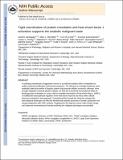| dc.contributor.author | Santagata, S. | |
| dc.contributor.author | Mendillo, Marc L. | |
| dc.contributor.author | Subramanian, A. | |
| dc.contributor.author | Perley, C. C. | |
| dc.contributor.author | Roche, S. P. | |
| dc.contributor.author | Wong, B. | |
| dc.contributor.author | Narayan, Rajiv | |
| dc.contributor.author | Kwon, H. | |
| dc.contributor.author | Golub, Todd R. | |
| dc.contributor.author | Porco, J. A. | |
| dc.contributor.author | Whitesell, L. | |
| dc.contributor.author | Lindquist, Susan | |
| dc.contributor.author | Tang, Yun-Chi | |
| dc.contributor.author | Koeva, Martina I | |
| dc.contributor.author | Amon, Angelika B | |
| dc.date.accessioned | 2015-03-27T16:25:19Z | |
| dc.date.available | 2015-03-27T16:25:19Z | |
| dc.date.issued | 2013-07 | |
| dc.date.submitted | 2013-03 | |
| dc.identifier.issn | 0036-8075 | |
| dc.identifier.issn | 1095-9203 | |
| dc.identifier.uri | http://hdl.handle.net/1721.1/96217 | |
| dc.description.abstract | The ribosome is centrally situated to sense metabolic states, but whether its activity, in turn, coherently rewires transcriptional responses is unknown. Here, through integrated chemical-genetic analyses, we found that a dominant transcriptional effect of blocking protein translation in cancer cells was inactivation of heat shock factor 1 (HSF1), a multifaceted transcriptional regulator of the heat-shock response and many other cellular processes essential for anabolic metabolism, cellular proliferation, and tumorigenesis. These analyses linked translational flux to the regulation of HSF1 transcriptional activity and to the modulation of energy metabolism. Targeting this link with translation initiation inhibitors such as rocaglates deprived cancer cells of their energy and chaperone armamentarium and selectively impaired the proliferation of both malignant and premalignant cells with early-stage oncogenic lesions. | en_US |
| dc.description.sponsorship | Kathy and Curt Marble Cancer Research Fund | en_US |
| dc.language.iso | en_US | |
| dc.publisher | American Association for the Advancement of Science (AAAS) | en_US |
| dc.relation.isversionof | http://dx.doi.org/10.1126/science.1238303 | en_US |
| dc.rights | Creative Commons Attribution-Noncommercial-Share Alike | en_US |
| dc.rights.uri | http://creativecommons.org/licenses/by-nc-sa/4.0/ | en_US |
| dc.source | PMC | en_US |
| dc.title | Tight Coordination of Protein Translation and Heat Shock Factor 1 Activation Supports the Anabolic Malignant State | en_US |
| dc.title.alternative | Tight Coordination of Protein Translation and HSF1 Activation Supports the Anabolic Malignant State | en_US |
| dc.type | Article | en_US |
| dc.identifier.citation | Santagata, S., M. L. Mendillo, Y.-c. Tang, A. Subramanian, C. C. Perley, S. P. Roche, B. Wong, et al. “Tight Coordination of Protein Translation and HSF1 Activation Supports the Anabolic Malignant State.” Science 341, no. 6143 (July 18, 2013): 1238303–1238303. | en_US |
| dc.contributor.department | Massachusetts Institute of Technology. Department of Biological Engineering | en_US |
| dc.contributor.department | Massachusetts Institute of Technology. Department of Biology | en_US |
| dc.contributor.department | Koch Institute for Integrative Cancer Research at MIT | en_US |
| dc.contributor.mitauthor | Tang, Yun-chi | en_US |
| dc.contributor.mitauthor | Koeva, Martina I. | en_US |
| dc.contributor.mitauthor | Amon, Angelika B. | en_US |
| dc.contributor.mitauthor | Lindquist, Susan | en_US |
| dc.relation.journal | Science | en_US |
| dc.eprint.version | Author's final manuscript | en_US |
| dc.type.uri | http://purl.org/eprint/type/JournalArticle | en_US |
| eprint.status | http://purl.org/eprint/status/PeerReviewed | en_US |
| dspace.orderedauthors | Santagata, S.; Mendillo, M. L.; Tang, Y.-c.; Subramanian, A.; Perley, C. C.; Roche, S. P.; Wong, B.; Narayan, R.; Kwon, H.; Koeva, M.; Amon, A.; Golub, T. R.; Porco, J. A.; Whitesell, L.; Lindquist, S. | en_US |
| dc.identifier.orcid | https://orcid.org/0000-0003-1307-882X | |
| dc.identifier.orcid | https://orcid.org/0000-0001-9837-0314 | |
| dc.identifier.orcid | https://orcid.org/0000-0001-7024-0921 | |
| mit.license | OPEN_ACCESS_POLICY | en_US |
| mit.metadata.status | Complete | |
